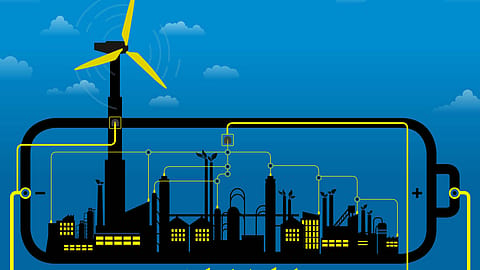Tata Power plans ₹75,000 crore capex to boost renewables biz
The company says it has earmarked ₹14,000 crore of consolidated capex in the financial year 2022-23 with ₹10,000 crore for the renewables business.

Tata Power on Thursday said it will spend ₹75,000 crore to expand capacity of its renewables business over the next five years as it looks to increase its green energy portfolio to 60%.
The company says it has earmarked ₹14,000 crore of consolidated capex in the financial year 2022-23 with ₹10,000 crore in the renewables business.
Tata Power, which added 707 megawatt capacity across renewables in FY22, has a ₹13,000-crore order book in its solar engineering, procurement and construction (EPC) business.
"Tata Power is looking to scale its Generation capacity to over 30 GW by FY27 from current 13.5 GW with an increased clean energy portfolio from current levels of 34% to 60% by 2027 and 80% by 2030," N Chandrasekaran, chairman of Tata Power, says at the company's annual general meeting.
In the transmission & distribution (T&D) business, the company will further optimise the Odisha discom operations, stabilise the new acquisition in the transmission business and deliver phenomenal customer service, enabled by digitalisation, Chandrasekaran adds.
The company is also setting up a 4 GW solar cell and module manufacturing capacity in Tamil Nadu with an investment of ₹3,000 crore.
"Your Company is on path to becoming an ESG benchmark in the power sector. In this pursuit, we have set ourselves on a path for three key goals of becoming Carbon Net Zero by 2045, 100% Water neutral by 2030 and Zero waste to landfill before 2030," says Chandrasekaran.
Recommended Stories
In FY22, Tata Power’s generation revenue rose by 28% and the return on capital employed rose 7.8% from 7.2% a year ago. The company also declared a dividend of ₹ 1.75 per share in FY22.
In April, Tata Power raised ₹4,000 crore from two foreign investment firms – BlackRock and Mubadala – to fund growth of its renewable energy business.
Last month, Fortune India reported that Tata Power is betting on its transformation programme, Tata Power 2.0, which focuses on sustainability, digital and customer-centricity, to become the ‘utility of the future’ — in short, transform itself into an energy solutions provider. With plans to phase out coal-fired power generation and expand green capacity to 80% by FY30, the firm is looking to future proof the careers of its employees in the thermal power business. Through a programme called ‘Daksh’, it reskills those employees and redeploys them in new growth businesses.